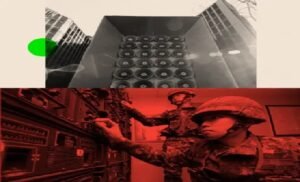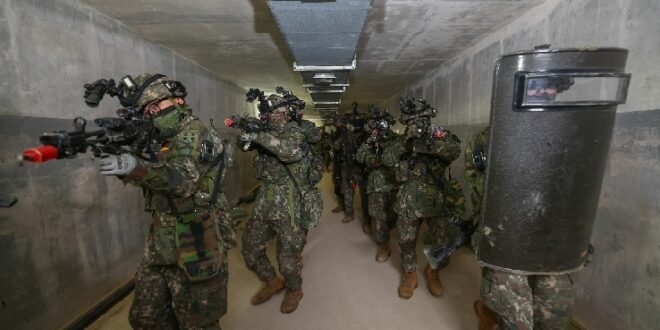01-06-2025
PYONGYANG/ SEOUL: The border between North and South Korea is swamped with layers of dense barbed-wire fencing and hundreds of guard posts but dotted among them is something even more unusual; giant, green camouflaged speakers.
As I stood looking into the North one afternoon last month, one of the speakers began blasting South Korean pop songs interspersed with subversive messages. “When we travel abroad, it energizes us”, a woman’s voice boomed out across the border, an obvious slight given North Koreans are not allowed to leave the country.
 From the North Korean side, I could faintly hear military propaganda music, as its regime attempted to drown out the inflammatory broadcasts.
From the North Korean side, I could faintly hear military propaganda music, as its regime attempted to drown out the inflammatory broadcasts.
North and South Korea are technically still at war and although it has been years since either side shelled the other, the two sides are fighting on a more subtle front; a war of information.
The South tries to get information into the North, and North Korea’s leader Kim Jong Un tries furiously to block it, as he attempts to shield his people from outside information.
North Korea is the only country in the world the internet has not penetrated. All TV channels, radio stations and newspapers are run by the state.
“The reason for this control is that so much of the mythology around the Kim family is made up. A lot of what they tell people is lies,” says Martyn Williams, a senior fellow at the Washington-based Stimson Center and an expert in North Korean technology and information.
Expose those lies to enough people and the regime could come crumbling down, is how the thinking in South Korea goes.
The loudspeakers are one tool used by the South Korean government but behind the scenes a more sophisticated underground movement has flourished.
A small number of broadcasters and non-profit organizations transmit information into the country in the dead of night on short and medium radio waves, so North Koreans can tune in to listen in secret.
 Thousands of USB sticks and micro-SD cards are also smuggled over the border every month loaded with foreign information among them, South Korean films, TV dramas, and pop songs, as well as news, all designed to challenge North Korean propaganda but now those working in the field fear that North Korea is gaining the upper hand.
Thousands of USB sticks and micro-SD cards are also smuggled over the border every month loaded with foreign information among them, South Korean films, TV dramas, and pop songs, as well as news, all designed to challenge North Korean propaganda but now those working in the field fear that North Korea is gaining the upper hand.
Not only is Kim cracking down hard on those caught with foreign content, but the future of this work could be in jeopardy. Much of it is funded by the US government, and has been hit by US President Donald Trump’s recent aid cuts.
So where does this leave both sides in their longstanding information war?
Smuggling pop songs and TV dramas
Every month, a team at Unification Media Group (UMG), a South Korean non-profit organization, sift through the latest news and entertainment offerings to put together playlists that they hope will resonate with those in the North.
They then load them onto devices, which are categorized according to how risky they are to view. On low-risk USBs are South Korean TV dramas and pop songs, recently they included a Netflix romance series When Life Give You Tangerines and a hit from popular South Korean singer and rapper Jennie.
High-risk options include what the team calls “education programs” information to teach North Koreans about democracy and human rights, the content Kim is thought to fear the most.
The drives are then sent to the Chinese border, where UMG’s trusted partners carry them across the river into North Korea at huge risk. (Int’l News Desk)
 Pressmediaofindia
Pressmediaofindia




